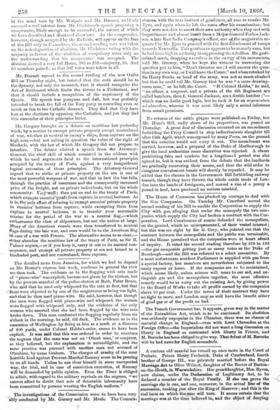Mr. Gregory brought on a debate on maritime law yesterday
week, by a motion to exempt private property except contraband of war, whether in neutral or enemy's ships, from capture on the high seas,—but not calling in question the value of the right of blockade, with the law of which Mr. Gregory did not propose to interfere. The debate elicited a speech from the Attorney- General, the chief skill of which consisted in the address with which he used arguments fatal to the international principles accepted by the treaty of Paris, against a very insignificant logical extension of those principles. The Attorney-General argued that to strike at private property on the sea is one of the most powerful weapons of war, and that in fact the loss falls, 'through the practice of insurance and the consequently increased price of the freight, not on private individuals, but on the whole community. -ter ell ; then put an end to the treaty of Paris, which exempts eneinie4eokfrom capture in neutral bottoms. As
it is, tlnyonly effect of refusing to -enemies' private property in enemies' bottoms from capture, while exempting them from capture in neutral bottoms, is to transfer your mercantile marine for the period of the war to a neutral flag,—which embarrasses the class of shipowners, but not the nation at large. Many of the American vessels were thus transferred to neutral flags during the late war, and ours would be to the American flag it, case of a war with France. The alternative seems to us clear,— either abandon the maritime law of the treaty of Paris, as Sir R. Palmer argues,—or if you keep it, carry it out to its natural con- 'sequence, and exempt all private property at sea not bound to a blockaded port, and not eontraband, from capture.






























 Previous page
Previous page